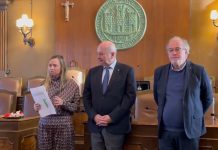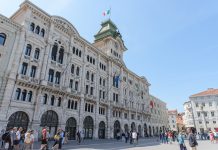by InTrieste
Interviews: Massimo Tognolli, Councilor for Social Policies of the Municipality of Trieste; Claudio Giacomelli, Regional Councilor representing the Friuli Venezia Giulia Region
In an effort to ease the daily burdens of pregnancy and early motherhood, the city of Trieste has launched a new transportation subsidy aimed at women expecting a child or raising infants. The initiative, presented Wednesday morning in the Sala Giunta of City Hall, offers financial support for the use of taxis and chauffeur-driven rental services across the city.
Known as the Bonus Trasporto Neomamme, the measure was formally introduced by Massimo Tognolli, Trieste’s Councillor for Social Policies. He was joined by Claudio Giacomelli, Regional Councilor representing the Friuli Venezia Giulia Region, and Sabrina Rudl, who leads the municipal division focused on poverty reduction and elderly home care.
“This is a concrete gesture for women in one of the most delicate and demanding phases of life,” Mr. Tognolli said. “It’s a simple idea, but one that we believe can have a significant impact on mobility and quality of life.”
The initiative is part of a regional plan funded through Friuli Venezia Giulia’s 2024 stability law (L.R. 16/2023, amended by L.R. 8/2024), which earmarks resources for the capitals of the region’s former provinces. Trieste received €83,815.03 based on the number of active taxi and NCC (chauffeur-driven rental) licenses recorded in the city as of October 31, 2024 — a total of 250 taxi and 40 NCC licenses.
Eligible residents—expectant mothers or women with children under the age of one who are officially registered in Friuli Venezia Giulia—can apply for the bonus through the municipality’s official website. The application process includes submitting proof of residence, a medical certificate or child’s birth certificate, and documentation of taxi or NCC expenses.
Applications and detailed guidelines are available at:
https://www.comune.trieste.it/bonus-neomamme
According to Ms. Rudl, the program not only addresses transportation costs, but also reflects a growing regional focus on family-oriented welfare policies. “This isn’t just about getting from point A to B,” she said. “It’s about making sure new mothers feel supported, safe, and seen.”
The subsidy joins a broader set of regional measures designed to reduce structural inequalities and offer targeted support to vulnerable populations—including the elderly and families with young children. City officials hope it will also promote more flexible and independent lifestyles for new parents navigating urban life.






























